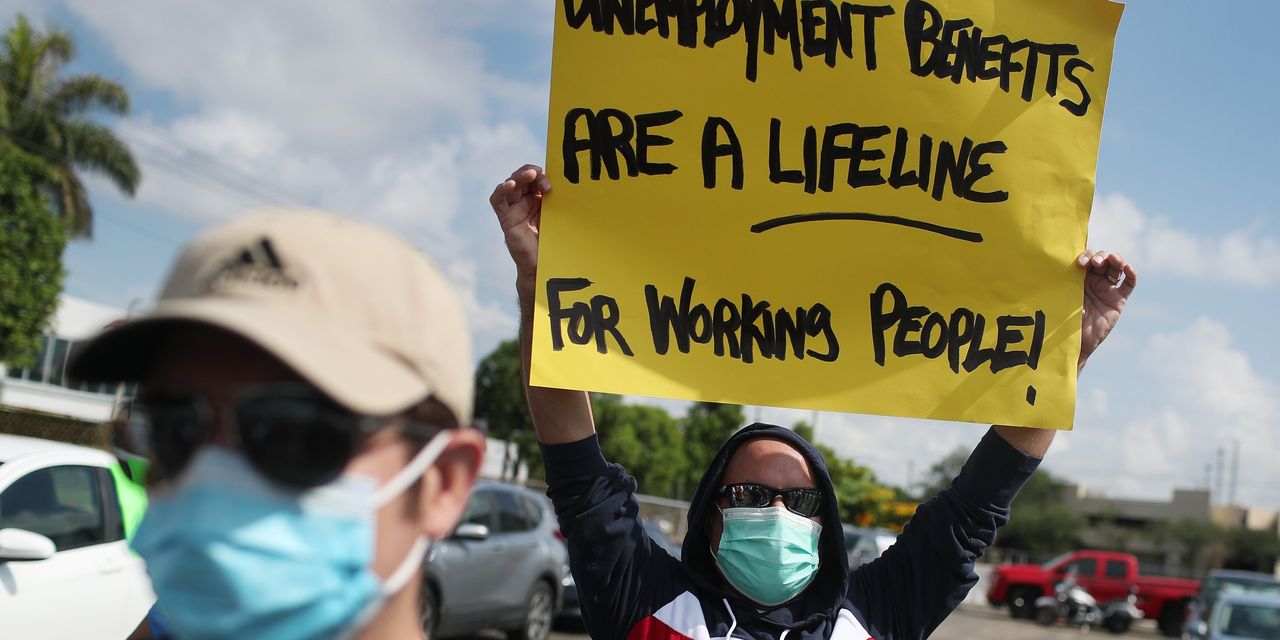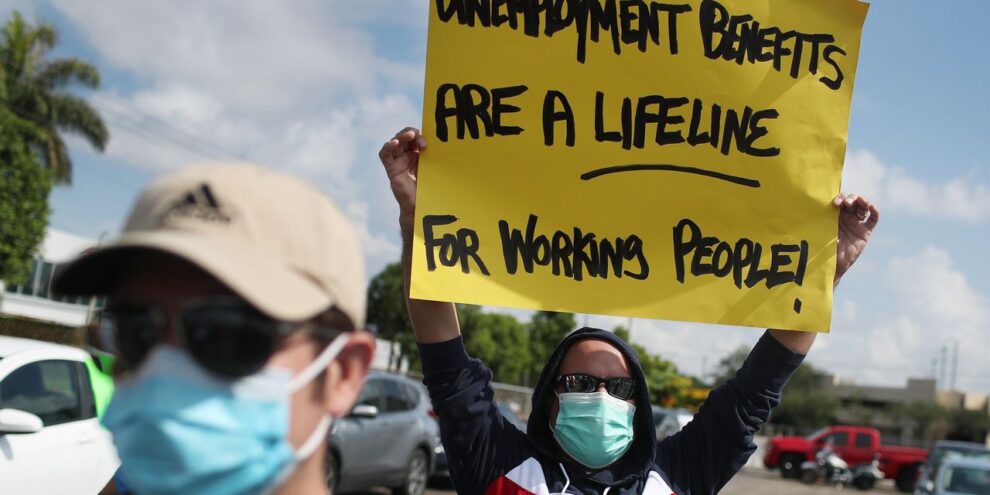
The wait is over.
“I’m terrified.” They were the words of Christine Gaydos, a 31-year-old new mother and stagehand in In New Castle, Del., in the weeks before November’s presidential election.
She had been out of work since March and has watched her monthly household income drop from approximately $6,000 to $1,420. “There are millions more like me. It seems like people like us are getting forgotten about right now,” she added.
Millions of Americans like Gaydos were relying on stimulus checks to put food on the table and pay the utility bills, and they are still relying on them now.
In fact, searches for “stimulus check” and “unemployment” also made the top 10 news topics on Google GOOGL, -0.82% GOOG, -0.97% as millions of Americans have lost their jobs.
Before the presidential election, a second round of financial-aid checks for American taxpayers was one of the few things Republican and Democratic lawmakers agreed upon.
On Sunday, however, the impasse was over. “We can finally report what our nation has needed to hear for a very long time,” majority leader Sen. Mitch McConnell (R., Ky.) said. “More help is on the way.”
That’s the good news. Now, for the bad news: Americans can expect only $600, half the amount they received earlier this year, or $2,400 for a family of four.
The $900 billon package also includes $300 in federal unemployment benefits for 11 weeks, again half of the original economic stimulus plan announced in March.
Out of nearly 890,000 Twitter votes on a poll by progressive Congresswoman Alexandria Ocasio-Cortez (D., N.Y.), 62% of people said a stimulus check of $600 was not enough.
Last March, Congress green-lit $1,200 stimulus payments for those making $75,000 per year or less under the bipartisan $2.2 trillion CARES Act.
Without agreement on additional unemployment assistance, some 12 million Americans would also lose their unemployment benefits the day after Christmas.
Ahead of November’s presidential election, House Democrats had pared back their version of the new stimulus bill from $3.4 trillion to $2.2 trillion, and Treasury Secretary Steven Mnuchin appeared receptive to a total stimulus package of $1.8 trillion.
But $600 in stimulus checks were not enough for some lawmakers.
Congresswoman Ayanna Pressley (D., Mass.) called the latest reports of a lower economic-impact payment an “insult,” while President-elect Joe Biden defended the plans, calling them a “down payment.”
On Saturday, Independent Sen. Bernie Sanders and former Democratic presidential hopeful Bernie Sanders tweeted TWTR, +2.27%, “Sen. Ron Johnson objected to my bill to provide $1,200 to working families and $500 for kids because he’s ‘worried’ about the deficit. Funny. He wasn’t so worried about the deficit when he voted to give $1 trillion in tax breaks to the 1% and large corporations. What hypocrisy!”
News of a new stimulus could not have come a moment too soon. As a result of the enhanced unemployment benefits and stimulus checks, which were both key parts of the CARES Act in March, Americans’ median checking-account balances increased by 65% on the year in April, according to a JPMorgan Chase Institute JPM, -0.49% report published last week.
By September, Americans drew out 50% of the initial balance gains in April, the report, which analyzed 1.8 million families’ Chase personal checking accounts, found.
Low-income households experienced the largest year-over-year percentage increase in median checking account balances in April (50%), compared to higher-income Americans who experienced a 35% increase in balances.
Congressional leaders, meanwhile, hoped to hold on a massive coronavirus stimulus and government funding bill after a late night resolution to a dispute over the Federal Reserve’s emergency lending powers.
Asked late Saturday if he thought votes were possible Sunday, Senate Democratic Leader Chuck Schumer told reporters: “It looks like we’ll be able to.”
Similarly, the schedule from House Majority Leader Steny Hoyer for Sunday advised members first votes of the day were expected no earlier than 1 p.m. Eastern.
The initial stimulus plan was “the best thing we’ve ever done for low-income families during an economic crisis and it’s not even close,” according to Luke Shaefer, a public policy professor at the University of Michigan who heads the school’s interdisciplinary Poverty Solutions initiative.
With the U.S. hitting record daily COVID-19 case counts, more public health steps like shutdowns may be necessary, Shaefer said. “It’s quite clear we’re going to need another economic stimulus to help families at this time,” he said.
If 2020 has any lesson, it’s that a lot can change in a little amount of time. So the exact sort of Biden administration actions might be uncertain, but here’s what we know the president-elect has been pledging on the campaign trail.
Independents and Democrats say it’s too little
The $1,200 in stimulus checks earlier this year were sorely needed. Nearly one-third (30%) of people said they used their $1,200 stimulus checks to pay bills, according to a survey released last August.
Earlier this month, Sen. Bernie Sanders and five of his colleagues in the Senate Democratic Caucus won’t back the bipartisan package.
The six Democratic lawmakers who signed the letter circulated on Tuesday signaled that they wouldn’t be willing to budge on anything less than $1,200, plus an additional $500 per child.
But Treasury Secretary Steven Mnuchin unveiled a new $918 billion aid proposal that calls for $600 stimulus checks for individuals and $1,200 for couples in place of enhanced unemployment benefits.
“Given the horrific extent of the current crisis and the desperation that working families all over this country are experiencing, this proposal does not go anywhere near far enough,” Sanders, a Vermont independent, wrote in a letter obtained by Politico circulated to Democratic lawmakers on Tuesday.
“The American people need help and they need help now. We agree with President-elect Biden that a $1,200 direct payment should be included in this proposal,” states the letter signed by Sanders and Sens. Kirsten Gillibrand of New York, Elizabeth Warren of Massachusetts, Ed Markey of Massachusetts, Jeff Merkley of Oregon and Ron Wyden of Oregon.
“Please join us in demanding that any new COVID-relief proposal includes a $1,200 direct payment to adults and $500 to their children.”
Republican Sen. Josh Hawley has urged President Donald Trump to veto a stimulus package if it doesn’t contain a second round of stimulus checks.
On Thursday the Missouri Republican, who is viewed as a potential Republican presidential candidate in 2024, unveiled standalone legislation that calls for a second round of $1,200 direct stimulus checks for individuals plus an additional $500 per child.
(Elisabeth Buchwald and Andrew Keshner contributed to this story.)











Add Comment